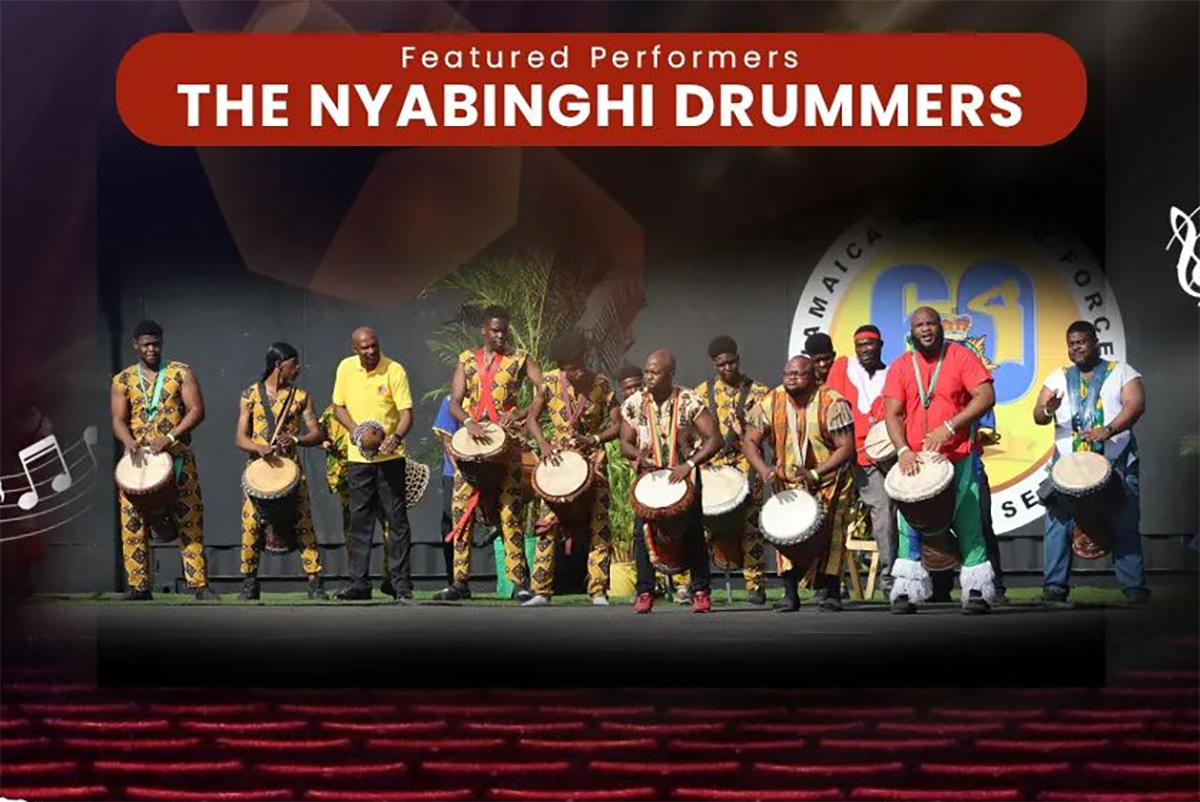Rastafarian Nyahbinghi Drumming For JDF’s National Poppy Appeal Festival Of Remembrance

The sound of Rastafarian music is expected to ring out at the Jamaica Defence Force’s National Poppy Appeal’s Festival of Remembrance at the Little Theatre this Sunday, as the Djembe-Kon Nyahbinghi drummers undertake a performance that the army has described as one which will be “chanelling Africa.”
“The beats from the Motherland and the spirits of our ancestors come alive when this group performs. Welcome to Djembe-Kon or the Nyabinghi Drummers as we call them, a vibrant cultural performance group dedicated to showcasing the rich traditions and rhythms of the Jamaican Culture,” the JDF noted on its Instagram page.
“They are passionate about preserving and promoting the captivating art form of drumming and dance, rooted in the cultural heritage of the Djembe traditional rhythms and dance. Play on Nyabinghi Drummers!!!” the organisation noted, while urging Jamaicans to come out in their numbers “to see them in action and support our veterans”.
Nyahbinghi drumming was created by various Rastafarian drummers in the 1950s, when they developed the style of ritual music and gave it that name. This type of drumming was influenced by various older forms of Afro-Jamaican musical styles, such as Burru drumming and the ritual drum styles found in religions such as Kumina and Revival Zion.
Nyahbinghi music has the distinction of birthing Shaggy’s breakout hit Oh Carolina, an interpolation of the Folkes Brothers original version which was produced by Prince Buster in 1958.
A November 2018 article in The Gleaner, titled The Music Diaries|The drama of ‘Oh Carolina, noted that the release of the original version of Oh Carolina in 1959 was “perhaps the most defining moment in Jamaica’s popular music history”.
“It was a landmark single in the development of Jamaica’s modern music – the first that moved away from the then current trend of imitating the American Rhythm and Blues, and into the area of Rastafarianism, incorporating African-influenced Nyabinghi drumming and chanting, which gave exposure to Rastafarians at a time when they were marginalised in the Jamaican society,” the article had noted.
According to the article, Oh Carolina, which was recorded in a small studio at RJR (now Radio Jamaica), has been cited by many as having a profound influence on the development of reggae.
“Surprisingly, though, Oh Carolina was never intended to promulgate or popularise Rastafarians or the Rastafarian culture. In fact, John Folkes, the second eldest of the Folks Brothers, who wrote the song, conceived it as a love song about his girlfriend with a similar name,” it added, refencing the verse: ‘Oh Carolina, honey darling, come back and make things right’.
Also in July 2014, another Gleaner article titled Jamaican records fill R&B gap, noted that while “the attempt to copy American rhythm and blues songs had indeed began in earnest”, in the midst of that came Oh Carolina, a “shock appearance of a Jamaican recording that was not rhythm and blues, calypso, mento, boogie or rock and roll”.
“It was a loner, a song ahead of its time, a watershed recording at that, and one that was the first in Jamaica’s music history to give the Rastafarian movement respectability,” the article noted.
“Although John Folkes was credited with authorship, Prince Buster must be fully commended and perhaps rewarded as the producer and arranger of a song that proved to be ‘a game-changer’ in Jamaica’s music history,” it noted.
According to the article, the Folkes Brothers had met Prince Buster while they were rehearsing at Duke Reid’s studios.
Prince Buster, upon hearing the song instantly liked it, and requested that he record it for them but was adamant that he wanted it to embrace African and Nyabinghi elements. And so the song came about with vocals by Mico, John and Eric Folkes, piano instrumental by Owen Gray, “handclaps by Buster, backed by the thundering cross rhythms of Rastafarians – Count Ossie and the Wareikas”.
